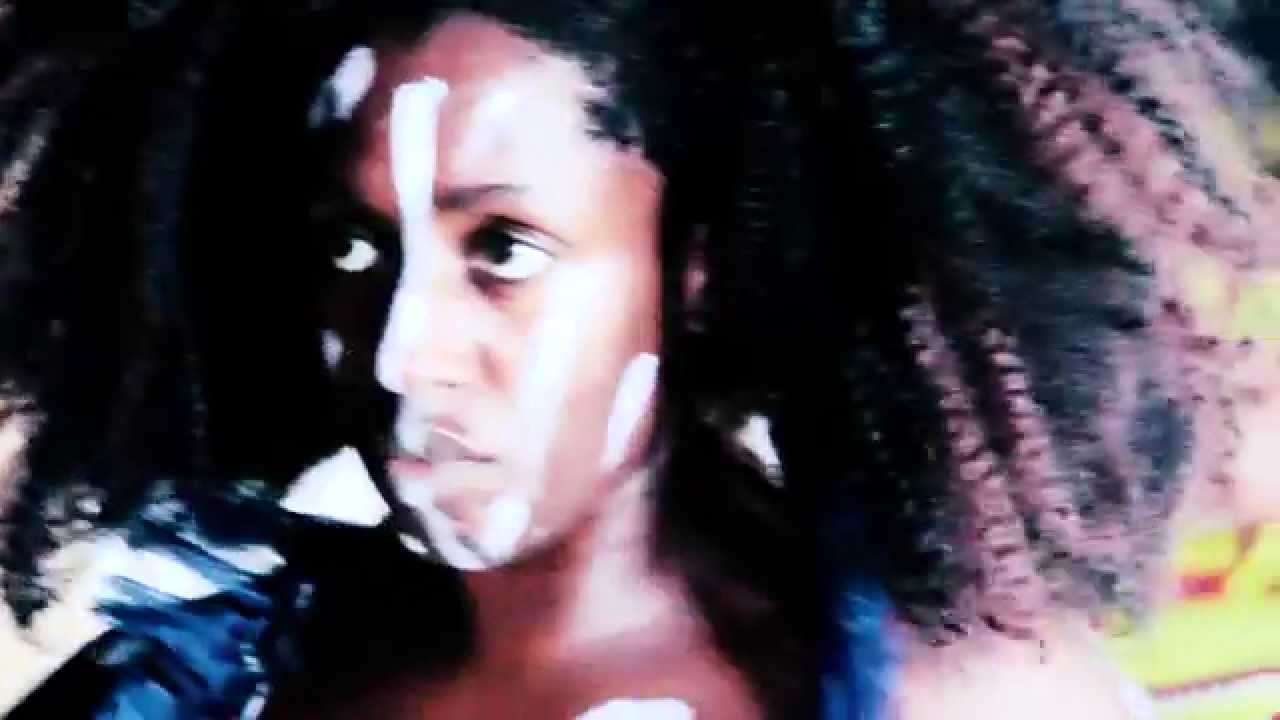Voodoo, debauched dancing, white-and-black minstrels, abused crucifixes, popcorn, twerking (culturally appropriated and otherwise), wigs, stilettos (knives and shoes), tits, bums, and a superb jazz drummer. Not your average night at the theatre.
What exactly is it? Is it a gig? Is it performance art? Is it immersive theatre? Yes to all of the above. Merging a launch for a new single by Lady Vendredi and her band The Vendettas (What Time Is It? – available on iTunes now!) with performance work exploring the possibilities of self-exploitation, Battle Cry comes charging into the Roundhouse, guns ablazing, taking no prisoners.
Weaving through and around all this is an exploration of dance and ritual from the Vodou (aka Vodon aka Voodoo) tradition. Glueing it together is the exhilarating free-jazz funky music of three live musicians (playing drums, saxophones/other brass and percussion) and a laptop.
Audience members are free to wander, yet gently manipulated by the performers – encouraged with ease into a circle to witness the mesmeric undulations of the Yanvalou dance that bless the space at the beginning of the evening, or attracted by sound or light over to Pocha Nostra-style ‘stations’ in the corners, on which personal explorations of race, gender, and cultural identity – extreme versions of the self – are enacted.
See here, for example: Mexican performer Ignacio Jarquin, who has transformed himself into a licentious priest or nun, a grotesque transgendered figure in a cassock, lying on his/her back, bare legs akimbo as s/he tries to force her feet into ridiculously high heeled shoes. And there: a devil-girl anointing herself with lipstick, pushing what looks like a Guy Fawkes mannequin around in a trolley; a creature bedecked with a swathe of West African cloth, wearing a Lucha Libre mask; and now Lady Vendredi herself (Nwando Ebizie), pushing the blaxploitation card to the max, shaking her booty in her sequinned bikini, donning her minstrel costume and tap shoes, and inviting audience members to help her white up.
Working well with all the supporting company of three musicians and five performers, with particularly electrically charged duets with Daniel Cunningham – her perfect foil in Eminem-esque backward baseball cap, shades, and white-boy rapper attitude – Lady V brings things to a head with an ecstatic Banda dance, which in the Vodou tradition evokes the disruptive spirits of the dead known as Ghede. The way this manifests is as a wild party dance in which invisible drugs are snorted, smoked and drunk; hilariously over-the-top orgies mimed; and great imaginary feasts gorged upon.
Battle Cry is one stop on a long journey: this particular leg started as a nine-day Secular Ecstatic Art performance laboratory, reported on by Total Theatre here. It is part of an evolving two-year process that will culminate in a show called The Passion of Lady Vendredi at Soho Theatre in spring 2016 (co-produced by MAS Productions and nitroBEAT).
So this is, I suppose we could say, a work-in-progress. There’s a lot of fabulous material on show here – the singing, the music, the vodou dance, many of the performance vignettes – but some things that are puzzling. An over-arching theme of an imaginary neo-feminist cult called M.A.M.A (Mothers Against Male Aggression) goes over my head: that what I’m witnessing tonight is purporting to be set within this cult is something I glean from the programme notes, not the performance itself, although knowing it makes sense in hindsight of some sections of the evening I’m not particularly drawn to, including a rather cringy moment in which men and women who’ve come to the show together are invited to pair up to enact confessions of male abuse. Although there is some take-up, many don’t want to – and same-sex couples and friends, and people who’ve come on their own, stand back bemused.
There are also transitions between musical numbers and performances in which the energy drops – often the times when Nwando takes to the mic to do typical between-song gig chat, which doesn’t work well in this context. It’s one of the few moments where the tug between gig and performance piece produces an uneasy compromise.
But it is early days, with many months to go before the full-length show comes to fruition – and the company and director Jonathan Grieve (formerly of Para Active, this current project in many ways the natural successor to that company’s extraordinary interactive show Zoo-Oids) are to be lauded for their refusal to play safe, constantly trying new material, and growing up in public rather than hiding away in the rehearsal room. This is the sort of work that needs an audience right there, live in the room, to see if things are working.
What I’m sure they’ll take away from this exhilarating and highly succesful showing at the Roundhouse is the knowledge that they have all the core elements in place: a fantastic persona in Lady Vendredi (performed with phenomenal verve and energy by Nwando Ebizie); great music, a truly innovative fusion; a fabulous team of supporting performers and musicians; a way of using the vodou material that works outside of its religious/ritual origins; and the praiseworthy intention of finding interesting, humorous and courageous ways to explore questions of race, gender and cultural identity. Most of all, what’s here is the passion. Everything’s ripe for the taking – go get, Lady Vendredi!

